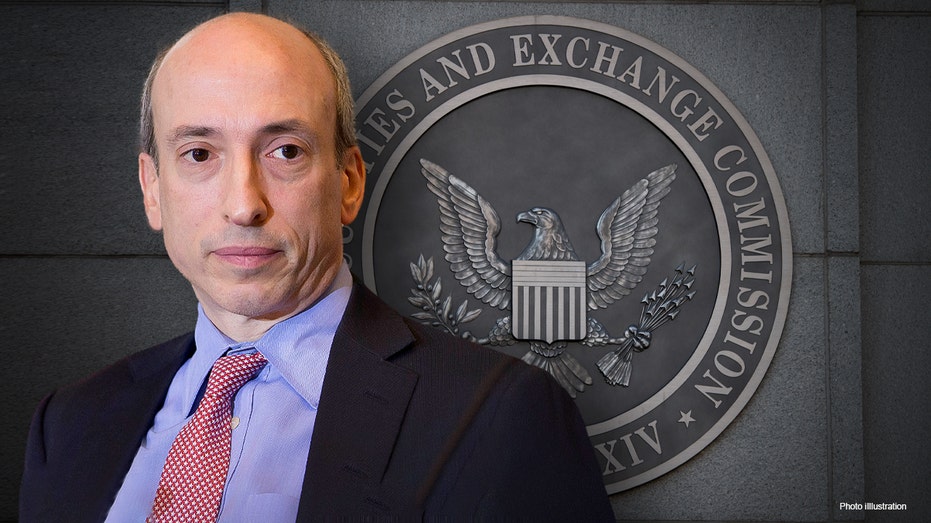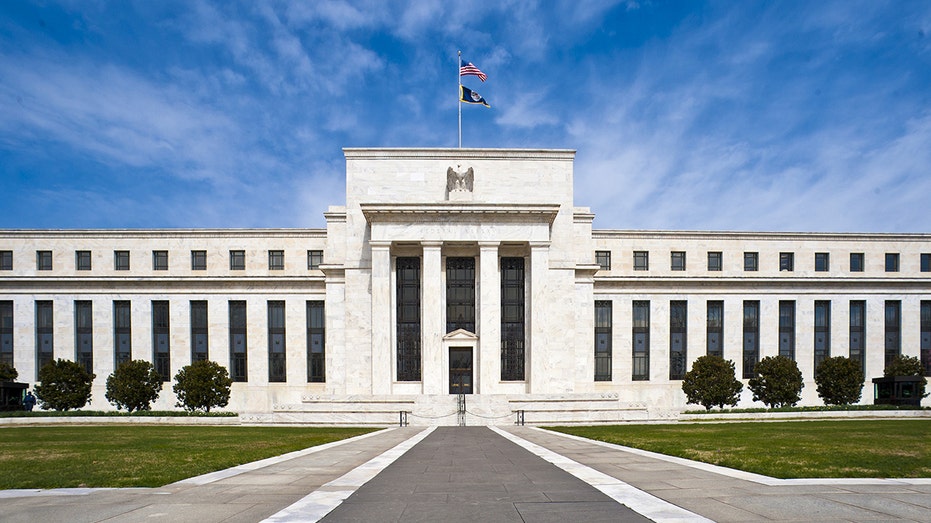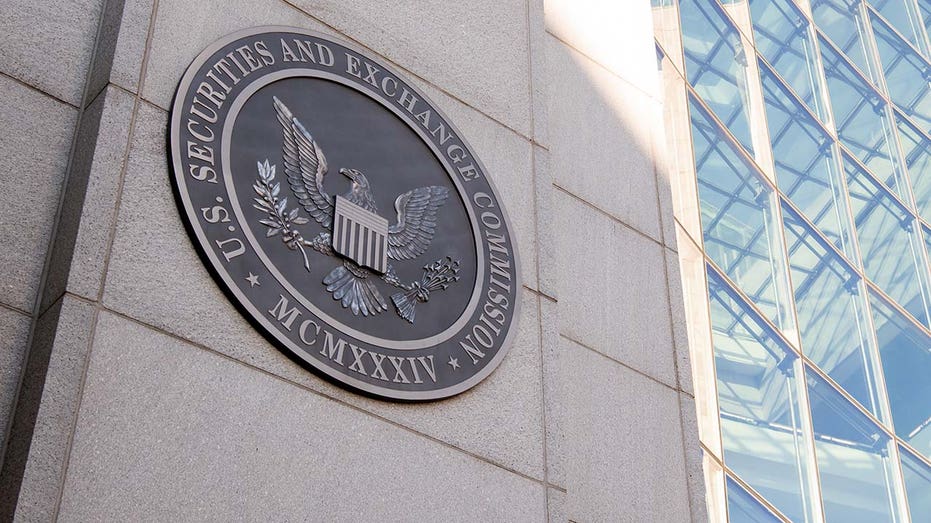Michael Lee, founder of Michael Lee Strategy, joins ‘Varney & Co.’ to discuss action in crypto markets and where he stands on Nvidia stocks.
The crypto industry has mounted a legal counteroffensive against U.S. regulators to fight what it sees as a government-wide attempt by the Biden administration to quash the $2 trillion digital asset industry, FOX Business has learned.
The pushback, in the form of lawsuits, lobbying Congress and challenging enforcement actions by the Securities and Exchange Commission (SEC) and other federal agencies, is not being coordinated by any one entity, sources familiar with the matter say. Yet as many as half a dozen crypto-related companies have mounted challenges to the White House’s effort to reign in the industry in recent months and the momentum is building, these people add.
Wall Street’s top cop, the SEC, and its crypto-skeptic chair, Gary Gensler, have brought a myriad of lawsuits against various players in the sector for what Gensler says is mass noncompliance with various securities laws, including crypto companies refusing to register their businesses with the SEC. Crypto players say existing registration procedures are not compatible with blockchain technology, the foundation of their business, and thus they are not in violation.
The result: A torrent of legal action by the SEC that’s being challenged by crypto players large and small.

Securities and Exchange Commission Chairman Gary Gensler (Andrew Harrer/Bloomberg via / Getty Images)
What’s interesting about crypto’s response is that most regulated industries cave when faced with government enforcement actions or choose to quietly fight regulatory overreach through behind-the-scenes lobbying. The crypto industry is doing just the opposite, fighting the cops on the crypto beat using various public forums, including the courts.
Industry executives interviewed by FOX Business say they have both the money and the law in their favor to challenge the government’s crackdown. That’s because crypto, they say, is a unique business that does not fit neatly into any existing regulatory framework.
CRYPTO NO LONGER OUTSIDER AT FAMED MIAMI BEACH ETF CONFERENCE
“There was a time when what the SEC said could be relied on as gospel, but that’s no longer the case,” Coinbase Chief Legal Officer Paul Grewal told FOX Business. “The crypto industry is using the judicial system to push back against regulatory overreach and get clarity for the industry – and it’s working.”
Legal Precedent On Their Side
An SEC spokesman declined to comment, but major players in the digital asset industry believe they have legal precedent on their side following Grayscale’s victory against the commission in August, which led to the SEC’s ultimate approval of 11 spot bitcoin exchange-traded funds last month. The move is widely regarded as a watershed moment for the industry.
Crypto’s pushback has also been inspired by Ripple Labs’ partial win over the SEC in July when a Southern District of New York judge declared sales of the digital token XRP on the secondary market not to be securities, as the agency claimed, and therefore outside the SEC’s jurisdiction.
Now other crypto players believe that the SEC and other regulators are on shaky legal footing and ripe for legal challenges.
Coinbase, the U.S.’s largest cryptocurrency exchange and a vociferous advocate of fair crypto policy in Washington, D.C., is currently going toe to toe with the SEC in a New York federal court, disputing the regulator’s claim that it’s operating as an unregistered securities exchange by selling unregistered securities in the form of crypto tokens on its platform.
Southern District of New York Judge Katherine Polk Failla is set to decide any day on whether to grant Coinbase’s motion to dismiss the lawsuit entirely or let the commission’s case move forward to the discovery process.
Last week, Kraken, the second-largest cryptocurrency exchange in the U.S., announced it filed a motion in a Northern California District court to dismiss a lawsuit brought by the SEC in December alleging that, like Coinbase, the company is operating an unregistered securities exchange and offering similarly unregistered securities to investors.
The SEC’s actions against Kraken and Coinbase reinforce the commission’s view that some digital assets offered on their platforms are securities that have not been registered with the agency, and thus are trading illegally.
CRUZ, GOP SENATORS DOUBLE DOWN ON ANTI-CENTRAL BANK DIGITAL CURRENCY LEGISLATION
Kraken told FOX Business that it’s fighting back because it believes none of the tokens it offers constitute securities under current law, since Congress has not yet legislated on whether digital assets are securities, commodities or fall into their own unique category. Kraken says the SEC’s case rests on an expansive new theory that would effectively “securitize” a broad range of ordinary assets and commodities.
The SEC also sued Binance in June, alleging that the world’s largest crypto exchange, its founder, Changpeng Zhao, and its U.S. exchange Binance.US sold unregistered securities to American investors. Binance is pushing back on those claims in court.
Bitcoin Foundation Chairman Brock Pierce discusses Bitcoin’s performance following an ETF selloff and former President Trump’s concern over digital currencies.
Industry participants and trade groups are showing support for their peers by filing amicus briefs – written arguments from individuals or organizations that have a strong interest in a case and seek to influence a court’s decision in favor of a certain party.
In Ripple’s case, the crypto industry submitted 14 amicus briefs. Eight were filed on behalf of Grayscale and six have been filed for Coinbase. Kraken received support from the Digital Chamber of Commerce, a crypto trade group, when it filed an amicus brief on Tuesday, stating it is stepping in to end the SEC’s attempt to regulate the industry without legislative authority.
“It looks like the crypto industry is finally getting itself organized and pushing back against SEC overreach in a coordinated fashion,” said crypto lawyer James Murphy, founder of Web3 consulting firm Ludlow Street Advisors LLC.
Miners On the Attack
FOX Business was first to report last Thursday that another corner of the crypto market – the bitcoin miners – filed a lawsuit in the Western District of Texas, suing the Energy Department, its analytical agency the Energy Information Administration, and the Office of Management and Budget over the “unlawful” collection of proprietary data from 82 bitcoin mining firms.
Its lawsuit, filed by Texas-based blockchain miner Riot Platforms alongside crypto trade groups Texas Blockchain Association and the Chamber of Digital Commerce, was in response to a move by the Office of Management and Budget, which oversees federal agency spending, to grant the EIA’s “emergency request” to collect data on miners’ energy consumption for a new survey that would analyze energy implications of crypto mining in the U.S.
On Friday afternoon, the defendants succeeded in procuring a temporary restraining order against the EIA, which prohibits the agency from enforcing the survey on bitcoin miners for another four weeks.
“The Court believes that Plaintiffs are likely to succeed in showing that the facts alleged by Defendants to support an emergency request fall far short of justifying such an action,” District Judge Alan Albright wrote in his motion to grant a temporary restraining order. “As a result, the determination likely violates the Administrative Procedure Act (APA) as ‘arbitrary, capricious, [or] an abuse of discretion.’”
LIVE CRYPTOCURRENCY PRICES: HERE
The judge also found the EIA’s estimated 30-minute time frame for the completion of the survey to be “extremely inaccurate and grossly misleading,” citing the defendants’ claims of spending more than 40 hours attempting to answer survey questions.
The EIA declined to comment.
A preliminary injunction hearing was scheduled for Feb. 28, where Riot and its co-defendants were planning to testify in favor of getting the survey thrown out entirely. The hearing was canceled on the evening of Feb. 27, following a telephone conference between the represented parties where an “agreement-in-principle” was reached on the underlying dispute, leading some to believe the EIA plans to retract the survey altogether.
“We can’t share details at the present time,” said a spokesperson for co-plaintiff Chamber of Digital Commerce. “But we are optimistic we can share an update in the next few days.”
Regulation is ‘Arbitrary and Capricious’
It’s not the first time a government agency has been called “arbitrary and capricious” by a federal court.
Last year, the D.C. Circuit Court of Appeals said the SEC acted “arbitrarily and capriciously” when it denied a petition from crypto asset manager Grayscale to convert its Bitcoin Trust into a spot ETF.
A panel of three judges unanimously voted that the agency’s argument that a spot ETF, which tracks the daily price of bitcoin, is materially different from a futures ETF, was not sufficient grounds for denial. The SEC approved the first bitcoin futures ETF in 2021.
Grayscale’s victory ultimately led to the SEC’s approval of the 11 spot bitcoin ETFs, finally bringing the world’s largest digital asset to the portfolios of traditional Wall Street investors in a conventional ETF wrapper.
CRYPTO WORLD, WALL STREET AWAIT POTENTIAL SPRING APPROVAL OF SPOT ETHER ETF
Ripple Labs, hailed as the first major crypto company to stand up to the SEC, secured a split victory in its three-year-long legal battle with the SEC in July when Southern District of New York Judge Analisa Torres ruled that sales of the digital token XRP are not securities offerings when sold on the secondary market on exchanges.
Another government regulator that’s found itself in crypto’s legal crosshairs is the Federal Reserve. Wyoming-based Custodia Bank sued the Fed in June 2022 when its member bank, the Kansas City Fed, delayed a decision to grant Custodia access to its banking services.

The main entrance to the Marriner S. Eccles Federal Reserve Board Building in Washington, D.C. (Smith Collection/Gado / Getty Images)
Custodia’s lawsuit, filed in a Wyoming district court, alleges that the Fed’s board of governors intervened at the Kansas City branch to deny Custodia access purely because of its affiliation with crypto.
The Federal Reserve has advised banks to be wary of doing business with crypto due to liquidity risks associated with the industry.
A spokeswoman for the Fed had no comment.
A district judge is set to decide on Custodia’s motion for summary judgment (where a party asks a judge to decide a case based on facts and evidence without going to trial) as early as next month.
Lawsuits Pour In
Meanwhile, lawsuits against the SEC continue to pour in from crypto companies.
Lejilex, a new crypto trading platform, sued the SEC in Texas federal court last week alongside the Crypto Freedom Alliance of Texas, an industry trade group, arguing that sales of digital assets on its platform are not securities, as the agency alleges.
Hodl Law, a crypto-focused law firm, recently filed a lawsuit before the 9th U.S. Circuit Court of Appeals, arguing that it’s justified in suing the SEC over its ambiguous crypto policy.
The firm’s argument stems from the SEC’s decision not to grant a 2022 petition from Coinbase that sought new, comprehensive rules for the crypto industry, which it believes are incompatible with current regulations that govern traditional assets like stocks and commodities.

The headquarters of the Securities and Exchange Commission in Washington, D.C., on Jan. 28, 2021. (Saul Loeb/AFP via / Getty Images)
The commission denied Coinbase’s petition in a 3-2 vote in December, stating that it fundamentally disagreed with Coinbase’s argument that the current SEC regulatory framework is “unworkable” for the crypto industry.
“I disagree that the SEC is acting outside its jurisdiction; they have a good faith basis for their enforcement actions to date,” said former SEC attorney Marc Fagel. “But when it comes to secondary market trading, the novelty of crypto makes the law far murkier.”
GET FOX BUSINESS ON THE GO BY CLICKING HERE
Crypto industry participants and attorneys believe the so-called “novelty factor” of crypto – that it’s a nascent industry that traditional securities laws weren’t designed to regulate – can be solved with comprehensive legislation for digital assets from Congress. A handful of bills are currently pending in the House and Senate, but crypto lobbyists on Capitol Hill say it will be a hard push to get any crypto-related legislation passed in an election year when other issues like the rising national debt and border crisis loom large.
“While we persist in our efforts to collaborate with lawmakers, the crypto industry must also navigate the present landscape. We are pursuing legal avenues to ensure our voice is heard and our sector can continue to innovate,” said Taylor Barr, senior policy associate at the Chamber of Digital Commerce, a crypto advocacy group. “As Congress turns its attention to other urgent matters, our resolve only strengthens.”

